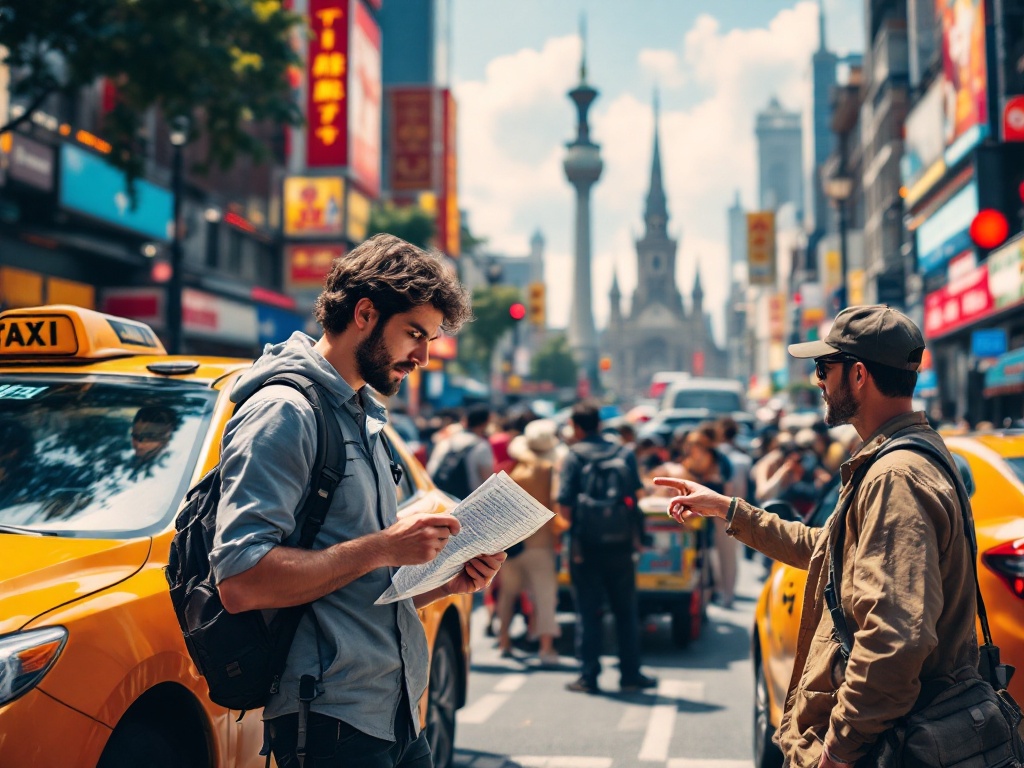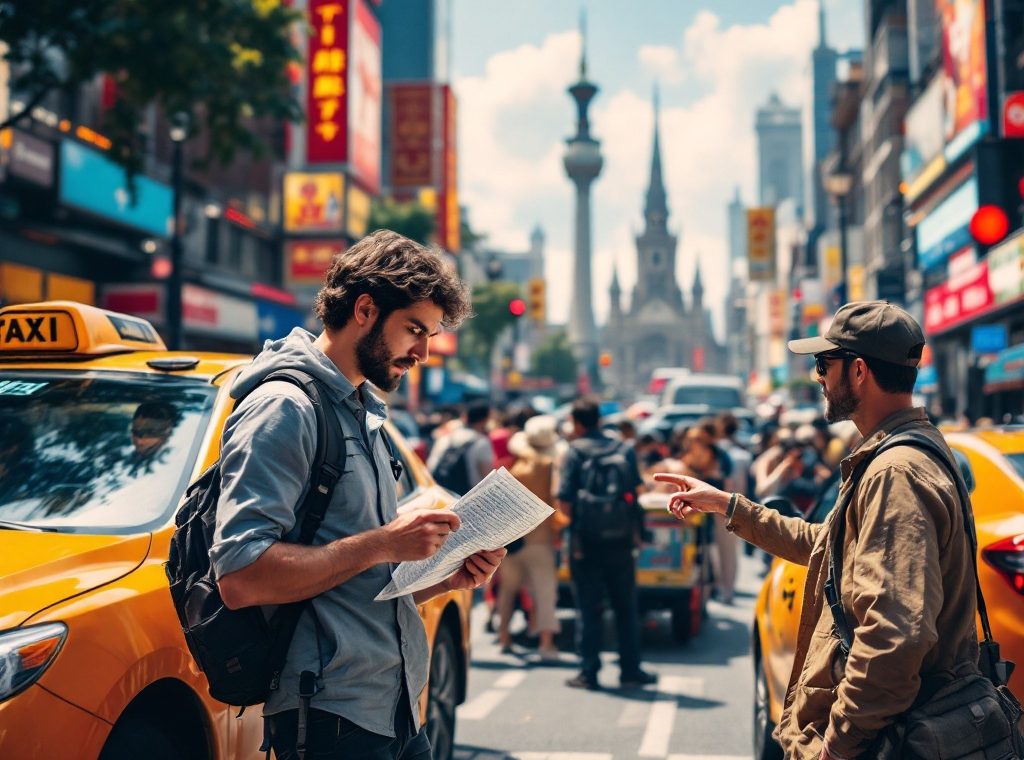How to Avoid Tourist Scams Abroad
Don’t let scams ruin your dream vacation! From fake taxis to rigged games, unsuspecting travelers are often targeted. Learn how to protect yourself from common travel scams and avoid falling victim. Discover practical tips, including pre-trip research, choosing reputable companies, and recognizing warning signs. Read on to ensure a safe and enjoyable travel experience.
Important information

- Research common scams at your destination and choose reputable transportation and tour companies.
- Be wary of deals that seem too good to be true, overly friendly strangers, and distractions.
- Protect your belongings in crowded areas and secure your valuables. Set taxi fares upfront.
- Verify information about closures with official sources and be cautious at ATMs.
- Report any scams to the Federal Trade Commission (FTC) at ReportFraud.ftc.gov.
Understanding Travel Scams and How to Avoid Them
Travel scams often target unsuspecting tourists. These scams can range from fake taxis and rigged currency exchanges to deceptive tours. Scammers frequently operate in crowded areas, preying on travelers in unfamiliar situations. Remember, if something seems too good to be true, it probably is. Trust your instincts; if a situation feels off, it’s best to walk away.
Protect Yourself From Travel Scams
- Research common scams at your destination before traveling.
- Choose reputable transportation and tour companies.
- Keep your belongings secure.
Stay Aware and Vigilant
- Be mindful of your surroundings, especially in crowded areas.
- Trust your gut; if something feels wrong, remove yourself from the situation.
- If a deal seems too good to be true, exercise caution.
What Are Common Travel Scams?
Beware of fake taxis, these often inflate fares or use rigged meters.
Be extra cautious in crowded areas, as pickpockets target valuables in these locations.
Avoid rigged games, they are designed for you to lose your money.
Be wary of deceptive tours, these promise a lot but deliver very little for a high price.
Don’t fall for the “closed” attraction trick, this is used to redirect you to more expensive options.
Be skeptical of fake petitions and charities, they often solicit donations for non-existent causes.
Watch out for the “attractive flirt” scam, where charm is used as a distraction while accomplices steal your belongings.
Stay alert and protect yourself from these travel schemes.
How Scammers Deceive Tourists
Be alert to distractions. scammers employ various tactics, such as:
- Staged arguments,
- Intentional bumps,
- Overly friendly interactions,
- Unsolicited help.
Some might even request payment for services you never asked for.
Incredible deals are often too good to be true. Aggressive vendors and fake petitions are also common ploys. Tourists should be particularly wary of these deceptive tricks.
Signs of a Scam: What to Look For
Unbelievably good deals are often too good to be true—they’re frequently scams. Be wary of prices that seem significantly lower than market value, as they may indicate fraudulent activity.
Excessive friendliness from strangers or aggressive sales tactics should raise suspicion. Legitimate businesses typically maintain a professional demeanor and avoid pressuring customers.
Be mindful of distractions, as scammers use them to their advantage. They may create a sense of urgency or employ diversionary tactics to manipulate your decision-making.
Another common trick is the false claim of a closed site. Verify the site’s legitimacy through other channels before making any commitments.
Research and Preparation Before Traveling
Planning a trip? Don’t let scams derail your adventure. Thorough research is your best defense against fraud. Before embarking, familiarize yourself with common scams at your destination. Use resources like travel forums, blogs, and local news to stay informed.
Choose Reputable Companies
Opt for reputable companies, but remember that even they can be fronts for scams. Check reviews and official sources to verify their legitimacy. This protects you from potential fraud.
Consult Travel Resources
Government travel advisories and online travel communities offer invaluable insights. Learn from others’ firsthand experiences. Gain a deeper understanding of local scams to stay safe and prepared.
Knowing the Common Scams of Your Destination
Before you travel, do your research. Travel guides, blogs, and online forums can reveal common scams and offer valuable travel tips. Checking local news and social media can also highlight current scams targeting tourists. Be extra cautious in popular tourist hotspots, as these areas are often prime targets for scams.
Choosing Reputable Companies
Choose reputable travel agencies, tour operators, and airlines with positive reviews.
Verify their registration and licensing for peace of mind.
Explore online forums and review sites for past customer experiences.
Consider personal recommendations from trusted sources like friends, family, or travel agents.
Researching Travel Companies for Potential Scams
Before booking, thoroughly investigate the company online. Explore review sites like Trustpilot and the Better Business Bureau to gauge their reputation and see what previous customers have to say. Verify their credentials, including business licenses and contact information. Confirm the company has a legitimate physical address, not just a P.O. Box or generic email, which can be warning signs.
Explore review sites like Trustpilot and the Better Business Bureau to gauge their reputation and see feedback from previous customers.
Verify the company’s credentials, including business licenses and contact information.
Confirm the company has a legitimate physical address, not just a P.O. Box or generic email address.
Practical Tips for Scam Prevention
Listen to your intuition. If a situation feels wrong, it probably is. Don’t hesitate to walk away. Projecting confidence is crucial, as scammers often target those appearing hesitant. When using services like taxis, always establish the fare upfront to avoid later disputes. Here are some additional safety tips for your trip:
- Research your destination: understanding local customs and laws can help you avoid unintentional missteps,.
- Share your itinerary: let someone back home know your plans, including flight details and accommodation information,.
- Stay aware of your surroundings: avoid walking alone at night, especially in unfamiliar or poorly lit areas,.
- Secure your belongings: use hotel safes for valuables and be mindful of your bags in crowded places,.
- Carry a copy of your passport: keep it separate from your actual passport in case of loss or theft,.
- Learn basic local phrases: knowing how to ask for help or directions can be invaluable,.
- Register with your embassy: this can assist them in contacting you in case of an emergency,.
- Be cautious of overly friendly strangers: while locals are often welcoming, be wary of those who seem too eager to help,.
- Avoid displaying large amounts of cash: this can make you a target for theft,.
- Use reputable transportation services: stick to official taxis or ride-sharing apps and avoid unmarked vehicles,.
- Stay connected: ensure your phone is charged and consider a local SIM card for easy communication,.
- Be prepared for unexpected events: having travel insurance and a backup plan can provide peace of mind,.
- Trust your instincts: If something doesn’t feel right, remove yourself from the situation,.
Trusting Your Instincts and Using Common Sense
If a situation feels off, it probably is. Trust your instincts, particularly when you’re in unfamiliar places.
Be observant of your surroundings. Note anything that seems out of place or suspicious.
Common sense is key to avoiding scams. Be skeptical and don’t fall for high-pressure tactics.
Avoid impulsive decisions. Take your time to think things through before committing to anything.
A cautious approach can prevent many issues. Being careful and mindful can protect you from unnecessary problems.
Exuding Confidence to Avoid Being Targeted
Projecting confidence can deter scammers, as they often target individuals who appear hesitant or unsure. Maintaining eye contact demonstrates alertness and discourages unwanted attention.
Staying aware of your surroundings demonstrates alertness and discourages unwanted attention.
Setting the Price First and Avoiding Price Confusion
Pre-arranging transportation costs prevents disputes and unexpected charges. Knowing the fare upfront protects travelers from hidden fees, confusion, and potential scams, providing peace of mind. Booking your transport in advance eliminates the risk of unexpected price increases and allows you to budget effectively. This also ensures a smooth and stress-free travel experience.
Protecting Yourself Against Specific Scams
Stay vigilant in crowded areas to protect your valuables from pickpockets. Consider using anti-theft bags or money belts and avoid displaying expensive items.Agree on a taxi fare before your journey to prevent overcharging. Choose reputable taxi companies or ride-hailing apps. Confirm your route before starting the trip and be wary of unmarked taxis or unnecessarily long routes.Research attraction opening hours beforehand and confirm closures through official sources. Be skeptical of redirects to alternative locations, which can be scams.Choose well-lit ATMs in secure areas and check for skimming devices. Shield the keypad when entering your PIN and decline assistance from strangers.Be cautious of fake petitions and charity scams. Treat requests for money or signatures with suspicion and support legitimate charities through official channels.Be wary of overly friendly strangers, as they may be using distraction tactics for theft or fraud. Remain aware of your surroundings and keep track of your possessions.
How to Protect Yourself Against Pickpocketing
When navigating crowded areas, stay vigilant and protect your belongings. Secure valuables in a money belt or deep inside pockets. Avoid displaying expensive jewelry or electronics. Consider using anti-theft bags for added security to deter potential thieves.
The Taxi Overcharge and Cabbie Fare Padding
Taxi fares can be inflated for tourists. Research typical fares before your trip. Before getting in a taxi, confirm the price with the driver and negotiate if possible. Ride-hailing apps often offer transparent pricing and are a good alternative. Insist on meter usage or agree on a fixed fare in advance. If you suspect an overcharge, note the taxi and driver’s information and report it to the local authorities and your embassy.
Beware of Claims That a Site is Closed
Beware of scams falsely claiming a site’s closure. These scams often redirect unsuspecting tourists to expensive or unsafe alternatives. Always verify closure information with official sources before your trip to ensure safety and avoid these traps.
ATM Safety and Avoiding ATM Scams
Inspect the card reader for any signs of tampering.
Shield the keypad with your hand as you enter your PIN to block any hidden cameras.
Be aware of your surroundings and avoid ATMs in dimly lit or secluded areas.
If anything seems suspicious, choose a different ATM.
Avoiding the Fake Petition and Charity Scams
Be aware of fake petitions and charity scams designed to exploit tourists’ empathy. Scammers often invent heartbreaking stories to evoke emotional responses and solicit donations. Always verify a charity or petition before contributing. Be cautious of aggressive solicitors demanding immediate donations. Legitimate organizations are happy to provide documentation.
Recognizing the Attractive Flirt Scam
Be wary of “flirt scams,” a real threat to travelers. Thieves use charm and distraction, often appearing overly friendly to unsuspecting tourists. Their goal is to steal valuables. Be cautious of overly flirtatious strangers, especially in crowded areas. If a situation feels suspicious, trust your instincts. Protect yourself and your belongings.
Emergency Contacts and Reporting Scams
Before your trip, designate emergency contacts and share your itinerary with family or friends. Give them your contact information and accommodation details so they know your location and can help if problems arise, such as scams. If you experience a scam, report it to the Federal Trade Commission (FTC) online at ReportFraud.ftc.gov. This helps authorities monitor scams and prevent them in the future. When reporting, include details like the scam type, people involved, and any financial losses.
Establishing Emergency Contacts While Traveling
Before traveling, create an emergency contact list. Include family, close friends, and your embassy or consulate. Give this list to a trusted person at home and save it on your phone. A physical copy is also recommended should your phone become unavailable. If you encounter a scam, these contacts can provide immediate assistance.
How to Report Travel Scams to the FTC
Have you fallen victim to a travel scam? Report it to the Federal Trade Commission (FTC) at ReportFraud.ftc.gov. Provide key details like the scammer’s contact information, what happened, and your financial losses. Your report helps the FTC track these scams and protect others.







